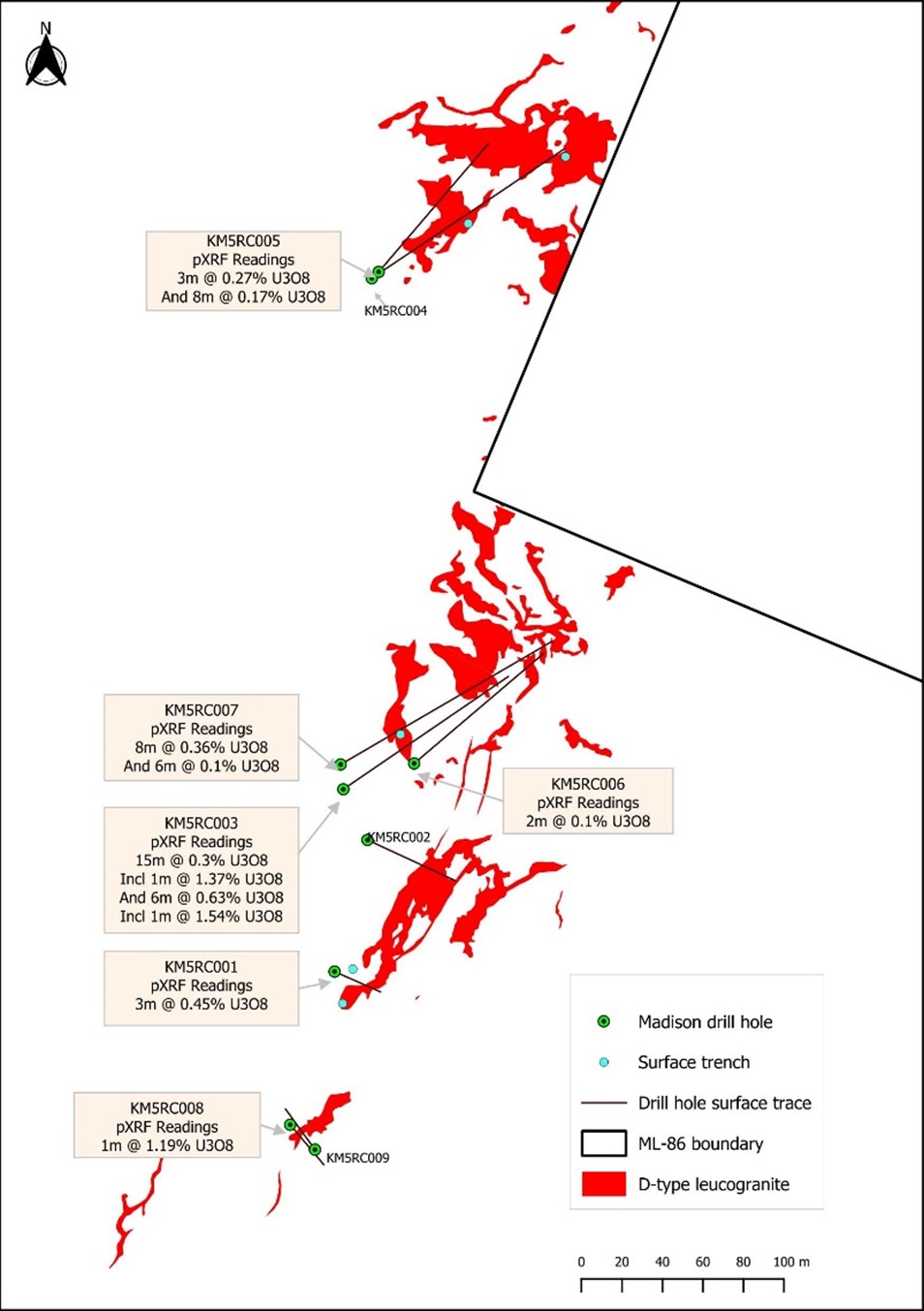Madison Metals Drilling Confirms High-Grade Uranium at Khan Project in Namibia, Africa
Madison Metals has announced the completion of their maiden drill program at the Khan Uranium Project in Namibia, drilling nine holes (997m) with six confirming high-grade uranium deposits. Key findings include uranium mineralization at depth in six holes, a significant 15m mineralized zone averaging pXRF 0.3% U3O8, and a maximum pXRF value of 1.54% U3O8. The drill program targeted subsurface uranium-bearing outcrops along a 12km anomaly. Despite ground access challenges, significant mineralized intersections were achieved. Future follow-up drilling is planned to further define the uranium's lateral and vertical extent.
- None.
- None.
TORONTO, June 24, 2024 (GLOBE NEWSWIRE) -- Madison Metals Inc. (“Madison” or the “Company”) (CSE: GREN) (OTCQB: MMTLF) (FSE: 4EF0) is pleased to announce that it has completed its maiden drill program of nine holes (997m) of Reverse Circulation (RC) drilling at its Khan Uranium Project at Madison West, located in Namibia’s Central Erongo Uranium province, and confirmed high-grade uranium deposits. Uranium mineralization was successfully intersected at depth in six of the nine drill holes.
The most significant observations during the Company’s chip logging include:
- Elevated pXRF* readings from chips with a maximum value of
1.54% U3O8 - Multiple mineralized zones intersected included a 15-metre (m) mineralized zone averaging pXRF
0.3% U3O8 - Fresh mineralized D-type leucogranite characterized by smoky quartz
- Uranium mineralization at depth in six drill holes
The recent nine holes confirm Madison’s geological expectations and logging has confirmed that uranium-bearing D-type alaskites have intruded the Khan group which is comprised of calc-silicates, quartzites and schists at depth.
“We are excited and encouraged by the results of our maiden drill program, having successfully intersected uranium mineralization at depth in six out of the nine holes drilled. This achievement marks a significant step forward in our exploration program,” says Dr. Roger Laine, a Director of Madison and geological engineer with 40+ years of expertise in advanced mineral exploration projects. “The confirmed stratigraphic level on the property provides the ideal conditions for high-grade alaskite-hosted uranium mineralization similar to that at the Rossing and Husab Mines in Namibia.”
The drill holes targeted various previously identified uranium-bearing outcrops along the 12-kilometre Anomaly 5 target. The holes were drilled to determine the sub-surface extension of high-grade uranium mineralization, both laterally and at depth. Uranium mineralization was intersected in six of the nine drill holes, with logged yellow product observed over the highest-grade intervals.

Figure 1: Location of the drill holes and significant observations
KM5RC001 was drilled to intercept mineralization between the surface Trenches KM5TR001 and KM5TR002. The drill hole intercepted a 3m mineralized alaskite starting at 19m below surface.
Two holes (KM5RC003 and KM5RC007) were drilled under the surface trench KM5TR003 and were extended to intercept a surface expression 50m from the trench. Both holes intercepted multiple lenses of mineralized alaskites of more than 2m thickness starting at 35m below surface. The deepest mineralized alaskites were intersected at 114m below surface in both drill holes.
The drilling has yielded significant achievements, even under challenging conditions. Due to ground accessibility issues, a set of fan holes (KM5RC005 and KM5RC006) was also drilled to intersect KM5TR004 and KM5TR005. KM5RC005 confirmed mineralization starting at 46m below surface.
KM5RC008 and KM5RC009 were drilled to test the surface mineralization and alaskite orientation south of KM5TR001. KM5RC008 intersected a 1m thick alaskite at 33m below surface with a pXRF reading of
Some RC chip samples have been sent for analysis, and final analytical assay results are expected in the coming weeks. Follow-up drilling is being planned to further define the lateral and vertical extent of uranium mineralization discovered to date.
*pXRF on RC chips were taken using a single reading through the calico bag for every metre. In relation to the disclosure of pXRF results, the Company cautions that estimates of U3O8 ppm from pXRF results should not be considered a proxy for quantitative analysis of a laboratory assay result. Assay results are required to determine the actual widths and grade of the visible mineralization.
Drilling has been completed on multiple azimuths and as fan drilling with multiple holes collared from a single drill site to minimize surface disturbance, which will result in some oblique intercepts to target orientations. The true thickness of intercepts will be accounted for following structural drilling and 3D modelling. All results in relation to this news release are drilled thickness and should not be interpreted as true thickness at this time.
Qualified Person
Mary Barton, a Professional Natural Scientist (SACNASP) and a Qualified Person for the purposes of National Instrument 43-101 (NI 43-101) Standards of Disclosure for Mineral Projects for ML86A, has reviewed, verified, and approved the technical information contained in this news release.
About Madison Metals Inc.
Madison Metals Inc. (CSE: GREN) (OTCQB: MMTLF) (FSE: 4EF0) is an upstream mining and exploration company focused on sustainable uranium production in Namibia and Canada. With over 50 years of mining experience, including 22 years in Namibia, its management team has geological and financial expertise and a track record of creating shareholder value.
Additional information about Madison Metals Inc. can be found at madisonmetals.ca and on the Company’s SEDAR+ profile at www.sedarplus.ca.
For further information, please contact:
Duane Parnham
Executive Chairman & CEO
Madison Metals Inc.
+1 (416) 489-0092
ir@madisonmetals.ca
Media inquiries:
Adam Bello
Manager, Media & Analyst Relations
Primoris Group Inc.
+1 (416) 489-0092
media@primorisgroup.com
Neither the Canadian Securities Exchange nor CIRO accepts responsibility for the adequacy or accuracy of this release.
Forward-looking Statements
This release contains “forward-looking statements” within the meaning of applicable Canadian securities legislation. Forward-looking statements include, but are not limited to statements regarding the proposed future exploration and drilling by Madison.
Generally, forward-looking statements can be identified by the use of forward-looking terminology such as “plans”, “expects” or “does not expect”, “is expected”, “budget”, “schedule”, “estimates”, “forecasts”, “intends”, “continue”, “anticipates” or “does not anticipate”, or “believes”, or variations of such words and phrases or statements that certain actions, events or results “may”, “could”, “would”, “will”, “might” or “will be taken”, “occur” or “be achieved”. Forward-looking statements are made based upon certain assumptions and other important facts that, if untrue, could cause the actual results, performance or achievements of the Company to be materially different from future results, performances or achievements expressed or implied by such statements. Such statements and information are based on numerous assumptions regarding present and future business strategies and the environment in which the Company will operate in the future.
Certain important factors that could cause actual results, performances or achievements to differ materially from those in the forward-looking statements include, amongst others: the global economic climate; competition; labour shortages, and unanticipated expenses of the Company. Forward-looking statements are subject to known and unknown risks, uncertainties and other important factors that may cause the actual results, level of activity, performance or achievements of the Company to be materially different from those expressed or implied by such forward-looking statements, including but not limited to: failure of the Company or its contractual partners to fulfil their respective obligations under agreements; unanticipated delays in drilling as described in this press release; the impact the COVID 19 pandemic may have on the Company’s activities and the economy in general; the impact of the recovery post COVID 19 pandemic and its impact on precious metals; receipt of necessary approvals; general business, economic, competitive, political and social uncertainties; accidents, labour disputes and shortages; environmental risks; and other risks of the mining industry.
Although the Company has attempted to identify important factors that could cause actual results to differ materially from those contained in forward-looking statements, there may be other factors that cause results not to be as anticipated, estimated or intended. There can be no assurance that such statements will prove to be accurate, as actual results and future events could differ materially from those anticipated in such statements. Accordingly, readers should not place undue reliance on forward-looking statements.
You can find further information with respect to these and other risks in filings made with the Canadian securities regulatory authorities that are available on the Company’s SEDAR+ profile page at www.sedarplus.ca. The Company disclaims any obligation to update or revise these forward-looking statements, except as required by applicable law.
A photo accompanying this announcement is available at https://www.globenewswire.com/NewsRoom/AttachmentNg/a382b7ac-eb39-4489-b12a-ce12526250c6








